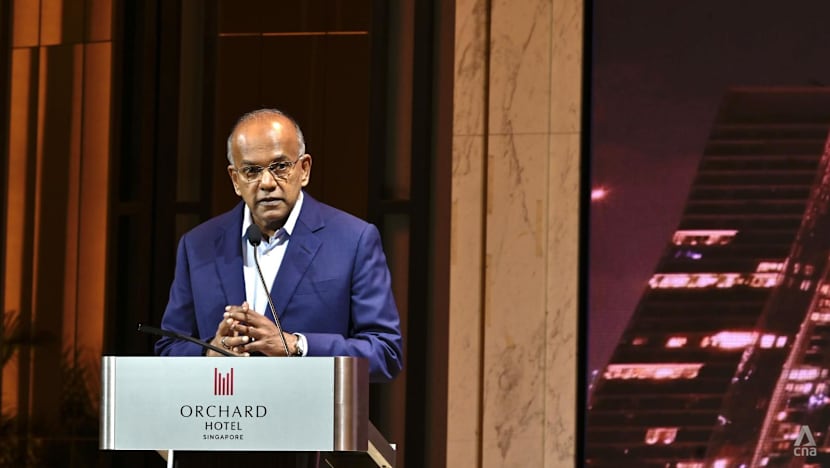Immediate recognition of a Palestinian state may not help the Palestinian cause: Shanmugam
Several conditions would need to be met including having a viable government, said Singapore's Coordinating Minister for National Security.

Coordinating Minister for National Security and Home Affairs Minister K Shanmugam gives the opening remarks at the Middle East Institute annual conference held at Orchard Hotel on Sep 2, 2025. (Photo: CNA/Tan Grace)

This audio is generated by an AI tool.
SINGAPORE: The immediate recognition of a Palestinian state would not change “the facts on the ground” in favour of the Palestinians, and could likely harm them instead, said Coordinating Minister for National Security K Shanmugam on Tuesday (Sep 2).
His remarks came amid recent plans by Australia and G7 members Canada, France and the UK to recognise Palestine at the next United Nations General Assembly later this month.
More than 140 out of 193 UN member states recognise a Palestinian state. The United States does not; and in Asia, Japan, Singapore and South Korea also do not formally recognise Palestine as a sovereign state.
Singapore has said since at least last year that it is “prepared in-principle” to recognise a Palestinian state, and that it would do so at an appropriate time.
On Tuesday, Mr Shanmugam said: “You have to ask whether recognising Palestine very immediately, where there is no viable government and there is no viable two-state solution, hurts or advances the Palestinian cause.
“(If) you recognise - what counter actions do you expect, and how do you think that it's going to actually change facts on the ground?" he added.
"My suggestion to you is it's not going to change it in favor of the Palestinians. It's likely to harm them."
He was speaking at the Middle East Institute's annual conference, in response to a question on what it would take for more countries including Singapore to recognise a Palestinian state.
Mr Shanmugam said three conditions need to be met for the state of Palestine to be viable: There needs to be a physical space, which Israel is “doing its best to prevent”; a population, though "current actions seem designed to destroy" a large number of the population or move them out of Gaza; and a viable government.
“What it really needs is support in the Palestinian Authority, giving them legitimacy and building them up to a stage where they can govern,” said Mr Shanmugam, referring to the government body which partially rules the Israeli-occupied West Bank.
“But again, the fact on the ground, I think, prevents the international community from doing that.”
"GROWING FEELING" IN SINGAPORE
The situation in the Middle East has also affected Singapore, including through the rising threat of radicalisation, said Mr Shanmugam.
He said Muslim communities in the region are paying greater attention to the events unfolding in Palestine, and are angry about it.
“The transition from that to people wanting to do something violent about it, either by going over to the Middle East or doing something in Singapore, we have seen some of it,” he said, citing how a handful of youths as young as 16 have been detained over their radical ideologies.
“The fact that, you know, they’re picking up 16-year-olds, 17-year-olds, tells you that there is a growing feeling," said Mr Shanmugam. "That is the threat of terrorism, and people wanting to take things into their own hands."
On Tuesday, he was also asked a few times about the role of the US in the Israel-Palestine conflict.
The minister said the US was probably the only country in a position to dictate Israel’s actions.
“Nevertheless, the United States has not taken any action, as far as I can tell, any significant action to prevent or change Israel’s cause of action or trajectory,” he added.
He also questioned if countries like Singapore or even larger countries could “overcome" American viewpoints "set in concrete” over decades, one of which was to “fundamentally to go along with almost anything that Israel does”.
“I’m not realistically a believer that we can alter that course,” said Mr Shanmugam.
















